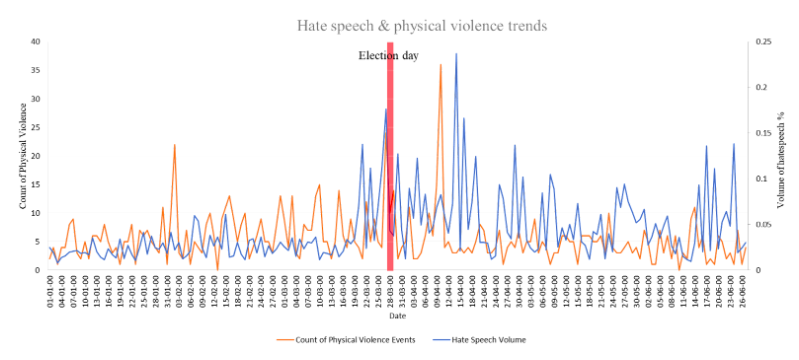Social media platforms can be a double-edge sword. They allow people to connect, express their opinion, and share events, regardless of their location in the world. At the same time, digital platforms can be exploited when people take advantage of the freedom of speech to abuse and degrade an individual or a particular group of people. Throughout the past year, a team of students, as part of Columbia University’s “Operation Consulting” course, focused on looking into the extent to which hate-speech on social media can be correlated to physical violence.
The joint project between UNDP and Columbia University aimed at the identification of a potential correlation between hate-speech on social media platforms and political violence. To facilitate the analysis of the thesis, a machine learning model was designed and trained to identify hate-speech and correlate it to political violence. For the report, the team selected Twitter for data collection because it has a rich data environment and is a relatively easy platform to “scrape” – meaning to automatically gather information. The project focused on the 2015 Nigerian elections as it was characterized by high levels of electoral violence. Twitter was used to perform the data collection of online hate speech, while ACLED provided the number of physical violence events in the specified location and time period.
The analysis and the visualization of physical violence and online hate speech produces significant findings that can prompt and promote further research in the field. By observing patterns of hate speech and physical violence within three months before and after the 2015 Nigerian elections, incidents of hate speech and physical violence seem to spike simultaneously. Even though this trend is observable in different dates, their similarity is the most evident in the extreme scenarios, where physical violence spikes significantly higher than the average. While similarities were observed in the graph, a regression model was unable to detect a robust statistical correlation between hate speech and physical violence due to the large time period studied.

This collaborative project between UNDP and Columbia University contributes to research on the relationship between physical violence and online hate speech. The similarities in political violence and hate speech trends call for further research in the field to better anticipate and prevent electoral violence through rigorous monitoring of online hate speech. Through the project, the students gained further insights into the significant contribution that technology and data analysis play in making the world a better place.


Please log in or sign up to comment.